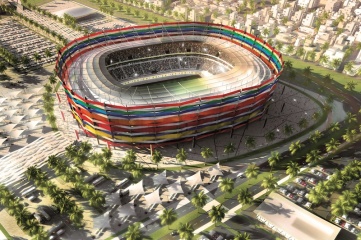As Qatar’s preparations for the 2022 FIFA World Cup enter the construction phase, the World Stadium Congress brings architects, solutions providers and stadium operations consultants to Doha on 19th May 2014.
This year’s World Stadium Congress, organised by IQPC, will focus on stadium design, sustainability and construction challenges.
ASTAD Project Management's H.E. Ali Bin Nasser Al Khalifa and SPOR SANAYI's Yasar Meral will open the first day of the conference with keynotes on world-class sporting infrastructure.
H.E. Ali Bin Nasser will provide an insight into the highly anticipated FIFA World Cup in Qatar in a session titled "Delivering world-class infrastructure to support Qatar 2022."
“Exceptional project management will play a critical role in the delivering a memorable mega-event," said H.E. Ali Bin Nasser.
"We will draw from ASTAD's significant experience building sports facilities in Qatar, but it is also important for senior stakeholders within the industry to share their expertise and knowledge so that we may identify solutions to common challenges and ensure continuous improvement in design and construction."
Tariq Al Abudulla, General Manager of the Qatar Olympic Academy and Head of Technical Affairs at the Qatar Olympic Committee, will follow with a keynote address on Day Two, laying out the Qatar Olympic Academy's unique Sport Venue Management programme.
Other speakers include Jon Sellins, head of business development consultancy at Wembley Stadium, who will draw from the Champions League Final 2013 to convey best practices in hosting and facilitating major sporting events.
Sustainability is the keyword at this year's conference. "It is important to us that the lasting impact of our stadiums on the community is a positive one," said Diogo Taddei, architecture manager at AECOM, Brazil.
"In designing the sporting and non-competition facilities for the Olympic and Paralympic Games in Rio de Janeiro, we took Rio's and Brazil's sporting ambitions into account and focused on the provision of a cost-efficient design for permanent and temporary venues. The legacy conversion plan cannot be overlooked."
Dan Meis, global director of sport at Woods Bagot, will also discuss stadium legacy and community integration, showcasing AS Roma's new €700m stadium as a mixed-use sports and entertainment destination.
"Given the number of stadiums that are being contemplated for the region, it is very important to discuss how we can ensure that these venues continue to benefit the community beyond the tournaments for which they were built," he said.
The congress will also feature panels, case studies and roundtable discussions. Meis, Taddei, Mark Fenwick of RFA Irribarren Architects, and Markus Pfisterer, director of GMP Architekten, will sit on a panel on trends in stadium design.
J Parrish, Director of Global Sports, AECOM, UK, event chair Paul Hyett of HKS Architects will also feature in roundtable discussions, along with representatives from Honeywell and Grundfos.
This year’s World Stadium Congress will host a financial perspective for the first time. Nermine Nassif Girgis Ishak, Head of Corporate Banking at Al Khaliji Commercial Bank will deliver a talk entitled "Financing growth and capitalising on development opportunities," an examination of opportunities in the Qatar projects market for local and international players.


